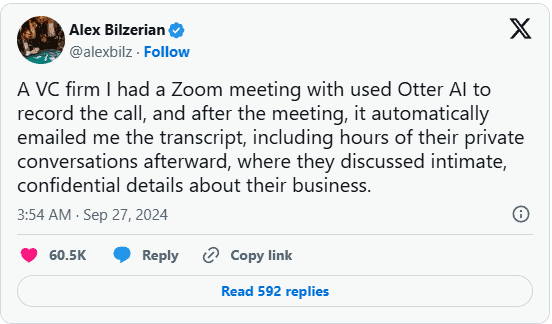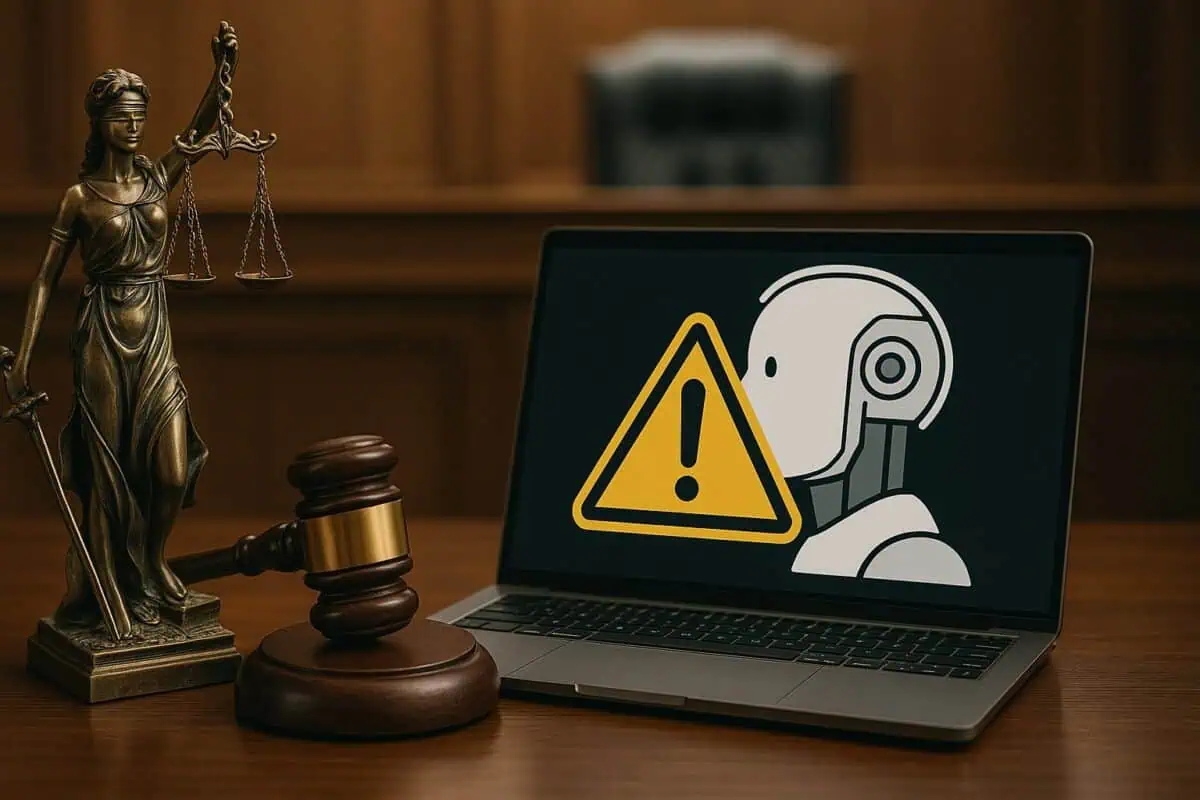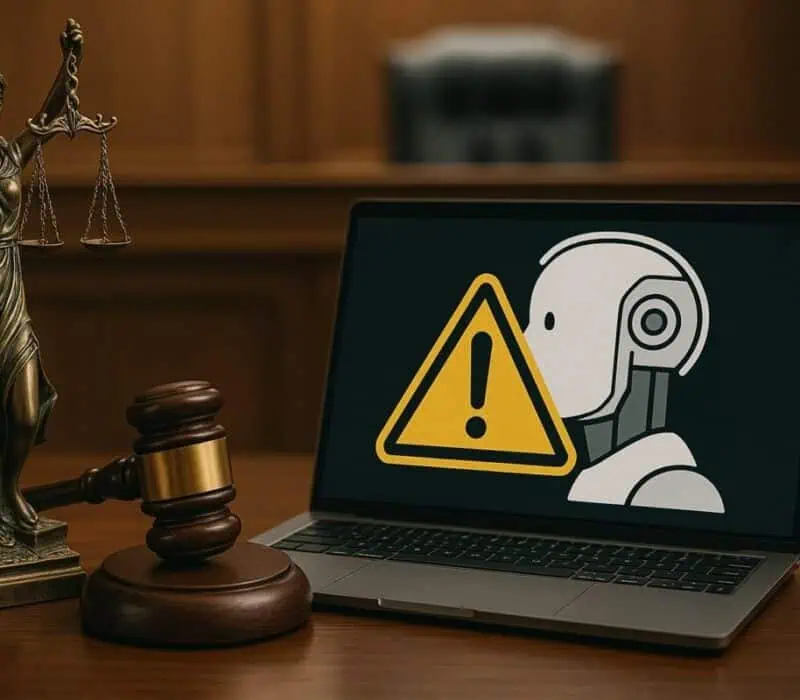Today, legal professionals face an uncomfortable truth. Artificial intelligence, one of the most significant technological innovations of the 21st century, is creating a security nightmare for the legal industry – where confidentiality is sacrosanct. Vulnerabilities and operational loopholes are exposing their firms to legal risks, especially when using AI for transcription. So, how can human-powered legal transcription companies step up?
In this article, you’ll learn how:
- Privacy is at risk when using AI for transcription, as they have the potential to share confidential content with people who should not see it.
- AI transcription is marred by errors at a concerning level, including the generation of false information.
- Organizations can be vulnerable to legal issues, as current AI transcription technology falls short of ADA compliance standards.
AI Breaches The Sacred Attorney-Client Bond
Arguably, the most critical risk legal professionals face when using AI is the potential compromise of attorney-client privilege, particularly serious in high-stakes settings like court transcription services.
Since the AI boom, law firms have increasingly used AI for daily administrative tasks, such as transcribing meetings. Although it might sound like a convenient solution, it comes with risks that are – by all metrics – more trouble than they’re worth.
Here’s a recent example: Alex Bilzerian, an AI researcher, received an automated transcript from Otter.ai.
The issue? Well, he got the entire meeting transcript, including discussions from before and after he was present.

See what I said about security nightmares? These are the things that make cybersecurity managers wake up screaming in cold sweat.
Now, in this instance, the damage was minimal. Due to the incident, Alex didn’t go through with the deal with the VC firm in question, and the matter is now settled. For them, at least.
However, for thousands of others using AI for transcription, this incident highlights the biggest risk in using AI for transcription – and that is the lack of confidentiality safeguards. Legal organizations are particularly vulnerable to these, as confidentiality is the cornerstone of their profession.
Sure, the AI transcription firm in question can disable the feature that caused the issue, promise users that security has been improved to avoid similar problems, and do everything else in between.
But ask yourself: what’s stopping them from using the information gathered from your automated transcripts?
Other Legal Risks of Using AI For Transcription
Here are other risks of using AI in legal settings.
Legal Consequences and Implications
| Category | Description |
| Regulatory Penalties | Non-compliance with data protection laws such as HIPAA, HITECH, and CJIS may result in substantial fines. |
| Financial Liability | Includes direct financial losses such as client revenue loss, settlement costs, and compensation for damages. |
| Reputational Harm | Breaches can significantly damage public and client trust, leading to long-term brand impairment and diminished business opportunities. |
| Civil Litigation | Potential exposure to lawsuits from individuals or entities affected by the unauthorized disclosure or mishandling of sensitive information. |
| Disclosure of Sensitive Data | Unauthorized access to personal, medical, legal, or proprietary information. |
| Identity Theft or Harm | Misuse of confidential data, such as addresses or medical records, can lead to personal harm. |
| Breach Notification Obligations | Legal requirements to notify affected parties and authorities may lead to heightened public scrutiny, and reputational damage. |
Justice System Faces a Dilemma With AI
Recently, the King County Prosecuting Attorney’s Office decided to reject all police report narratives produced with any sort of AI assistance.
The decision stemmed from issues such as compliance with Criminal Justice Information Services (CJIS) requirements, privacy concerns about free-to-the-public AI applications, the risk of all AI-generated hallucinations, the lack of error tracking systems, and the absence of draft prevention mechanisms.
As mandated, officers must certify their reports under penalty of perjury, which makes the legal implications of using AI even more serious in settings such as when a certified trial transcription is needed. In particular, even the tiniest AI-generated mistakes that go unnoticed during officer review could be exposed in court or deposition transcription.
Too Much Risk For Too Little Gain
Current research indicates that the accuracy rate of speech recognition and AI transcription is 61.92%. That level of accuracy may be acceptable for taking notes or setting up reminders – anything that doesn’t require legal, professional, or procedural use.
However, 61.92% accuracy is simply unacceptable for anything used in a legal setting.
If you don’t agree, ask yourself this: Would you trust a police transcript if 40 out of every 100 words are completely and utterly wrong? Our verbatim transcription ensures no word is missed. How about a medical consultation transcript? Or a business meeting transcript?
If that’s not enough for you, here’s a shortlist of the consequences of inaccurate transcripts provided across any industry and use case:
- Misinterpretation of Data
- Loss of Credibility
- Declining Patient Care
- Ethical Implications
- Resource Wastage
- Legal Consequences
- Impact on Future Research
- Compromised Decision Making
How Ditto Transcripts’ Trusted Service Ensures Data Security
Ditto has been in business for over a decade, and we know how to run a secure transcription platform that meets both overarching data privacy laws and industry-specific security measures.
Here’s how we do it.
Insurance Against Data Breach Damage
Checking if your transcription provider carries cyber liability insurance isn’t just a good idea – it’s a requirement. If a data breach occurs, you want to know that your vendor has the coverage to handle potential damages.
At Ditto Transcripts, we carry both general liability and stand-alone cyber liability insurance policies. We work with legal offices, government agencies, and law enforcement departments – places where security is non-negotiable.
Of course, none of that means anything without proof, so we encourage you to call us and ask for documentation and certificates. If you want to take it further, contact our insurance provider to confirm the policy is current and in good standing. That’s how seriously we take the importance of data security.
Dun & Bradstreet Ratings
Individuals often rely on consumer credit ratings. For businesses, having a Dun & Bradstreet D-U-N-S (Data Universal Numbering System) nine-digit number provides potential vendors, lenders, and clients a method to determine a company’s creditworthiness.
Over 330 million businesses currently have one, and you can obtain a D-U-N-S number at no charge.
Any business seeking to register with Dun & Bradstreet must be an established legal entity within its respective state (i.e., LLC, C-Corp, S-Corp, etc.). While not the only defining factor, acquiring a D-U-N-S number is a good way to show that the company is credible. Here’s ours.
Transcription platforms willing to stand by their information security and privacy measures can register online by providing the following information:
- Legal name of the business
- Headquarters name and address
- The company’s physical address and mailing address
- Doing Business As (DBA) name, if applicable
- Phone number
- Name and contact info of the business owner
- Number of employees
- If the business is home-based or has company offices
It should be a big red flag if your transcription company doesn’t have a D-U-N-S number.
HIPAA and HITECH Compliance
Claiming to have robust security measures is one thing. Subjecting your security measures to regulatory review is another.
As we all know, health information requires significant safeguards against unauthorized access and misuse. Otherwise, private, personally identifiable information and other sensitive data can be used for identity theft, fraud, and more.
That’s why transcription companies working on medical files must protect patient privacy by complying with the Health Insurance Portability and Accountability (HIPAA) Act and the Health Information Technology for Economic and Clinical Health (HITECH) Act. HITECH works hand in hand with HIPAA by promoting the adoption of secure electronic health records and increasing penalties for non-compliance.
These two regulatory bodies aim to safeguard sensitive information in their respective industries. Both lay out different guidelines and requirements to meet regulatory compliance – which costs money. In my years in the industry, I’ve seen that resources and effort are the two most commonly cited excuses for why some transcription providers refuse to meet HIPAA and HITECH requirements.
Not at Ditto. We’re both HIPAA and HITECH-compliant, meaning our transcription services meet the stringent requirements of these two agencies for privacy and security.
That’s not all; unlike some providers who price transcription security at different tiers, our HITECH and HIPAA-compliant services are available to all our clients. There’s no need to pay more or request additional protection for your data – it’s all included in our legal transcription pricing.
CAGE Codes
Any company conducting business with the Department of Defense and other related government services must obtain a Commercial and Government Entity (CAGE) code. The Defense Logistics Agency assigns and creates CAGE codes, which the DoD manages. CAGE codes help validate the legitimacy of suppliers and contractors, enabling the federal government to prevent fraud and ensure compliance with procurement regulations.
And yes, Ditto most certainly has a CAGE code.
Transparent Transcription Contracts With Public Entities
Many transcription companies claim they’ve worked with the government and other public entities. It’s a great addition to their portfolio – after all, if a government agency trusts the provider enough, then perhaps you should, too.
However, not all of them can provide proof, which is odd because government contracts in many states are subject to public disclosure.
Ditto Transcripts proudly holds a publicly available RFxPremier transcription services cooperative Master Agreement that allows any state agency or political subdivision in the United States access to the same pricing, terms, and conditions.
Ensure Your Data’s Security With Ditto’s Transcription Solutions
Choosing a transcription service you can trust has never been easier with Ditto. With our rigorous security measures, you can trust that your data is secure from start to finish. You only need to worry about accuracy, quality, and affordability – and we offer those, too.
Here are just some of the perks you get when you partner with Ditto:
- More than 99% accuracy on all projects
- Fast turnaround times
- Different affordable rates for different budgets
- Flexibility and customization
- No lock-in periods or contracts—pay as you go
- Multi-channel communication
- Industry-leading customer support
Ready to work with a company that takes your security seriously? Need help with typed documents instead? Our legal typing services deliver the same high standards.
Call us or sign up for our free, commitment-free trial and experience the difference.
Ditto Transcripts is a Denver, Colorado-based FINRA, HIPAA, and CJIS-compliant transcription services company that provides fast, accurate, and affordable transcripts for individuals and companies of all sizes. Call (720) 287-3710 today for a free quote, and ask about our free five-day trial.

